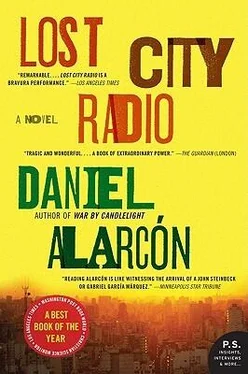“We don’t know, Father.”
The old man squinted. “Will I be invited?”
“Of course!” Norma said.
“Of course,” Rey added.
Things were happening that Norma didn’t understand. The old man poured some liquor onto his handkerchief, and cleaned the lenses of his glasses with it. “Let me see that ring,” he said. Norma held her left hand out, and the old man shook his head. “I see your career is not so lucrative, son.”
“I should have been a poet like you,” Rey said, and the old man laughed. They raised their glasses again, and everyone smiled.
“But child,” the old man said, turning to Norma, suddenly serious. “If you’re smart, you won’t take this name of ours.”
“What do you mean, sir?”
The old man and his yellow skin; the old man and the crooked teeth of his yellow smile. His lonely, wrinkled face. The room full of smoke. “This is no time to play dumb, child.”
“Don’t listen to him,” Rey said. “My father’s talking crazy.”
In the control room, years later, Elmer scanning the list: “Norma,” he said abruptly. “We have a problem.”
“I love you, Norma,” Rey said.
Those nightmares, Rey, where do they come from? What did they do to you?
“Our name is tainted, child.” The old man bit his lip and looked down. “I did my part, and my son has done his. I promise you: you don’t want it.”
“And I love you, Rey.”
The boy rapped on the window. He pressed his face to the glass and puffed his cheeks out. He was a beautiful boy.
“Norma, I’m sorry,” Elmer repeated, “but we have a problem.”
ELIJAH MANAU was a rosy-cheeked man from the capital, and had been living in 1797 for six months when the soldiers came. He was a timid man, and not without reason. To be exiled here to teach in this humid backwater was a testament to his consistent mediocrity. He had scored near the bottom on the regional placement exam, well below the cutoff for a job in the city at one of the better schools. The dispiriting results were announced on the radio a few nights after the test, in alphabetical order. It took several hours. His family was neither wealthy nor well connected, and so nothing could be done. He was thirty when he left home. He had never been to the jungle before. In fact, he had never left the city.
Manau carried with him the shame of an exposed man who had imagined his mediocrity to be a secret. It was dawning on him that he may have become the failure his father had always predicted he would be. The town, his new home, was perpetually soggy and heat-swollen. The rains came and brought little relief. He rented a room from a man named Zahir, who had lost both hands in the war. Zahir’s son, Nico, was an unwilling student, seemed to distrust his teacher and housemate. Sometimes Manau helped them tend to their small plot, but in truth, he had no skill for it. The earth held no romance for him. Manau longed for concrete and everything else he had left behind. Nico’s crippled father dug holes with his stumps, he carried heavy loads on his back, balancing rucksacks on his broad shoulders with help from his son. The man was a rock. At night, Manau listened to the mosquitoes thrumming in the humid air, to the distant cawing and various shrieks the jungle produced and, with his thin curtain drawn, he checked his naked body for the progress of the sores and rashes that were always afflicting him. It was his daily chore, an exercise in personal hygiene that had devolved into a strange kind of vanity. The pitiable condition of his person played a central role in his sexual fantasies. To be nursed back to health! To be massaged and anointed in fruit essences, in herbal potions! With a cloudy shaving mirror and the kerosene lamp, he examined himself — the carbuncular skin blossoming on his back and buttocks, beneath his armpits — and was satisfied that one day soon, he would look pathetic enough to stir something soft and generous in a woman’s heart. In the city, it was assumed that the heat made jungle women freer, and the prospect of these unknown women, their bronzed and beautiful legs spread wide, had, in fact, been Manau’s only consolation when he was informed of his teaching assignment.
Most mornings, after the rains, Manau arrived to the school early, to sweep the puddles away. The roof leaked, and there was nothing to be done about it. At the very least, he could be grateful for the raised wooden floor of the schoolhouse. Zahir said it would have to be replaced in a few years, but for now, it was fine: able to withstand, with a minimum of creaking, Manau’s unhappy pacing. The government had seen fit to send fifteen primitive desks where his students sat diffidently, waiting to be entertained — twenty had been promised, but an official in 1791 kept five for himself, and no one complained, so neither did Manau. He taught cheerlessly every morning, and sent his students home for lunch a bit earlier each day. They were all primitives. Manau had hoped to be seen as a knowledgeable and cultured gentleman from the city, but instead they were amused by his ignorance of trees and plants, disappointed by his inability to distinguish between the calls of various birds. “I don’t care about birds,” he said one day, and to his surprise, the words came out angrily.
It wasn’t that the children disliked him. Manau was inoffensively boring, taught listlessly, but he let them out early, on some days canceled class altogether, and no one seemed to mind. The day that the soldiers arrived in a pair of rusty, creaking green trucks, Manau was quick to call off school: there was an excitement in his students’ faces that he couldn’t compete with. He’d written some rules about fractions on the blackboard. He had never liked arithmetic. Outside, the engines rattled, and the soldiers set up tarps in the plaza. It was, he would later learn, the first time in more than a year that the soldiers had come. The presence of outsiders was electric and disconcerting. Eyes were wandering. Manau heard anxious fingernails scraping against the desks. It was no use. Go out into the streets, he ordered, learn about life! He smiled proudly as the schoolhouse emptied, as if, by dint of laziness, he had stumbled upon a new pedagogy, an educational masterstroke. His students left, all of them except Victor, whom he asked to stay.
In Manau’s visions, it was Victor’s mother, a widow, who would eventually take him in. She was older, he knew that, but with these jungle people, one could never tell. In his time in the village, Manau had learned a little of her past: she had fallen in love before with a stranger from the city, who had disappeared into the jungle at the end of the war. People said he was dead. So she was a free woman, and wasn’t Manau also a stranger from the city? The possibilities were quite obvious. But what stirred Manau most was what he could see: she was a real woman, with substantial thighs and a pleasing weight to her. She wore her black hair tied with a red band, and her smallish mouth seemed always ready to break into a smile. She was doe-eyed, a hint of pink in her cheeks. Her name was Adela.
Now the classroom had cleared, and her boy stood before him, waiting. “Victor,” he said. “Was your father a soldier?”
The boy looked baffled. In fact, Manau wasn’t sure himself why he had asked it. Only recently had his isolation become so stark, so complete, that he had resolved to do something about it. He saw her every day in the village, carrying a tray of silver fish on her head. Her undersized boy sat in the first row, next to Zahir’s son. Manau saw them; they were there — all he had to do was speak.
“No, sir,” Victor said. “I don’t think he was.”
Читать дальше












